|
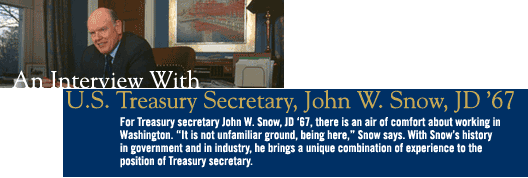
In the Ford administration, Snow served in various high-level positions in the Department of Transportation, including administrator of the National Highway Traffic Safety Administration, deputy undersecretary, assistant secretary of governmental affairs, and deputy assistant secretary for policy, plans, and international affairs. The deregulations of the airline and trucking industries top the list of major issues he tackled during that time.
Then as CEO of railroad conglomerate CSX, where he spent 20 years prior to this appointment, he visited Washington often, lobbying on Capitol Hill for transportation issues and influencing transportation policy.
Snow also has experience in dealing with the domestic and international business community. From 1994 to 1996 he served as chair of the Business Roundtable, the country’s leading business policy group, working to improve business ethics and address corporate governance issues.
Snow took office in January 2003, replacing Paul O’Neill. Snow has been noted in the media as having a pleasant demeanor with the media and a smooth and effective communication style, and his interview with GW Law School magazine was no exception. On a late afternoon this spring, Snow took time to sit down in his office with GW Law School magazine to address some of his most frequently-asked questions by the press.
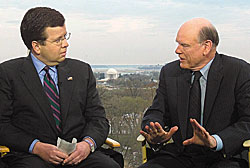 |
|
Snow during an interview with Fox News' Neil Cavuto.
Photo by Treasury Photo
|
GW Law School: The Treasury’s work is much different than it was before Sept. 11, 2001. How has it changed?
Snow: Of course, when I was in the government the last time, it was unthinkable that something like 9/11 would occur. There was no Department of Homeland Security. And we weren’t waging a war on the financing of terrorism. Treasury is now at the very center of the war on terror, indeed because the terrorists depend on financings and Treasury has the lead responsibility for interdicting the flow of funds and for engaging the financial community in the financial war on terrorism. Wherever money is exchanged it can become a vehicle for the movement of terrorist monies.
We just set up a new office—the Office of Terrorism and Financial Intelligence. The Treasury Department will now have its own high-powered intelligence gathering capacity right here and will work with the other intelligence gathering agencies to make sure that we’re collaborating. So there’s an intense focus in this building on the whole issue of terrorist finance. That of course is a tremendous difference from anything that had been the case in Treasury prior to 9/11 and certainly a whole new chapter in American life.
GW Law School: One of the most frequent questions you face concerns the administration’s tax cut, and one question is: Can we still afford it, given our country’s current state at war?
Snow: I can answer that very directly: Yes. What we can’t afford is an economy falling short of its potential. And tax cuts were designed to get the economy back on a growth path where it could achieve its full potential. One percentage point less growth in the American economy is roughly a hundred billion dollars. And because of the president’s decisive action with his tax initiatives, our estimates are we experienced roughly two percentage points faster growth than we would have otherwise. And that’s $200 billion that’s being made available that otherwise wouldn’t have been available. And that’s hundreds of thousands of people with productive jobs who otherwise wouldn’t have them. I’m very, very conscious of the budgetary deficit and of the issues the deficit faces, but we would have an even more pressing deficit: It would have been the jobs and growth deficit if the president hadn’t pressed forward. We have time to deal with fiscal deficit and we are dealing with it, but if we hadn’t taken decisive action on the economy, and the economy would have continued on that very weak course, we would have short-changed the American people.
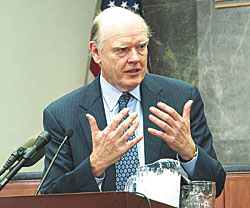
Snow took time out from his busy schedule March 3 to deliver the Law School’s 24th Annual Manual F. Cohen Lecture. Snow spoke about various topics relating to the economy and fielded serious questions from faculty members and students about current economic issues.
Photo by Claire Duggan
|
GW Law School: Speaking of the deficit, that must be the other top question you receive: How is the administration planning to deal with it? Economic observers suggest that productivity alone is not the answer.
Snow: Productivity is awfully important for any economy because it’s through productivity that economies create more wealth. It’s that ability to use resources better that frees resources to go into other uses. As that happens, the total size of the economy grows, and everybody wins. We’ve had the strongest three-year growth rate in productivity in almost 40 years. It’s probably slowed the job creation process some, because as firms have become more productive they’ve gotten more work out of their existing workforce, which is what productivity is. But you can’t get the economy growing jobs unless first it begins to grow. Because it’s when businesses see their order books fill up, it’s when they hear the cash register jingling at a more rapid rate, that businesses decide they need to expand. Now that the economy is growing, we see capital spending up, we see the unemployment rate coming down, we see initial claims for unemployment insurance down to three-year lows, and we’re beginning to see the jobs come back.
The deficit is a critical issue and a top priority of the administration. The budget deficit that we face today is unwelcome and it will be reduced. Under the president’s plan, by controlling spending and growing our economy we will reduce it dramatically—in fact cut it in half—over the next five years.
GW Law School: The United States is part of a global economy. How does the administration deal with the perception that sometimes domestic and global agendas seem to conflict?
Snow: Curious that you should ask that question today, because I am just back from testifying before the House Financial Services Committee, where the subject was the international economy and our involvement with and the role of the so-called international financial institutions such as the World Bank and the IMF, and one of the issues is: What are the American taxpayers getting for this engagement in the world economy through these financial institutions? Our view is that we have to engage through these institutions. They’re effective ways—they can be even more effective—but they’re important ways to deal with the issue of global poverty, important means of helping to create more stability and growth in the developing worlds, and they provide a backstop for financial instability, a way to get at, through the IMF in particular, financial instability. And we have a big stake in seeing the whole world more stable and more prosperous.
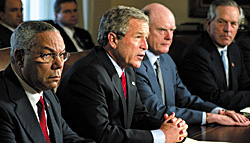 |
|
G.W. flanked by GW: Colin Powell (GW MBA ’71), President Bush, and John Snow—with Secretary of Commerce Don Evans to the right of Snow—during a Cabinet meeting at the White House in March. Photo by AP/WWP Photo/Charles Dharapak
|
GW Law School: One question you received from a GW Law student during your recent visit to campus concerned the effect on a small-town workforce of the relocation of a manufacturing plant. How do you deal with questions of job displacement?
Snow: We’re concerned about the loss of jobs for any reason. The most important thing we can do is strengthen the environment for job creation. That’s why the president has enacted tax relief that benefits millions of American families and businesses, boosts economic growth, and creates jobs. And these pro-growth policies are working: GDP growth is strong, unemployment is down and jobs are coming back.
It’s also critical that America’s workers have the training and education they need to seize new job opportunities. The president’s FY 2005 budget includes $23 billion for job training and employment assistance. Earlier this year the president proposed the Jobs for the 21st Century initiative, a comprehensive plan to better prepare U.S. workers to take advantage of the good paying jobs of the future.
GW Law School: There are globalization skeptics who think the United States should look inward for sufficiency given the new, post-Sept. 11, 2001, climate. What do you say to them?
Snow: The worst thing we could do would be to turn our backs on the world. Our customers, our future customers, are largely outside the United States. We need to tap into those huge markets that are outside the United States. And we’re succeeding. It’s really interesting to observe what’s happening in this dynamic world of international trade. We’re selling California wine to France. We’re selling cars made in South Carolina to the Germans. And we’re selling burritos made in the United States to the Mexicans. So there can’t be any question about whether we can compete. And rather than building walls around America to protect us, the real thing we need to do to enhance our prospects is tear down the walls outside the United States. And we also have to make sure that we help the people who are dislodged or displaced through this process. We have an obligation to ensure they have opportunities for enhancing their skills, learning new skills, lifetime learning.
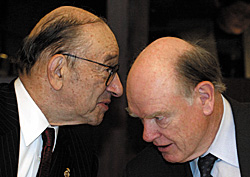 |
|
Federal Reserve Chairman Alan Greenspan speaks with Snow prior to a G-7 working meeting in April 2003 in Washington. Photo by AP/WWP Photo/Rick Bowmer
|
GW Law School: What is the administration’s view on the position of exchange rates and the world economy in general?
Snow: We don’t focus a lot of attention on the dollar, day to day, versus the others. We support the strong dollar, but the exchange value of the currency is best established through a system of open competitive exchange rates. Systematic interventions are not good policy. They prevent the marketplace from setting the appropriate value, and if you don’t have the appropriate value, the market tends to drive it toward the real value with bad consequences. One of the things that has happened that has been very beneficial to the world trading system is the movement on the part of so many countries to a system of fluctuating exchange rates. Imbalances in domestic economies are being addressed, and I think it’s one reason we’ve had fewer crises in the last few years and less strains on the international financial system.
We’ve had very good discussions at our regular G-7 meetings on the subject of growth. One of the points I’ve tried to make continuously is we suffer from too little growth in the world economy. Europe has been growing too slowly. Japan has been growing too slowly, well below its potential. Germany has been really anemic. And until the president could persuade the Congress to move forward with these tax cuts, our growth rates were pretty low. Now, in the last half of this year, we grew it 6 percent. So we’re back on a good growth path. Our growth helps Europe. Our growth helps Japan. Their growth helps us. We’re all in this together—let’s figure out how to grow faster. And that’s an agenda we call the agenda for growth and it involves each of the economies taking the particular steps to remove barriers to higher growth rates. Germany is now addressing its labor markets, France its pensions, Italy its tax system, and Japan its banking. We are addressing issues that we think impede growth like our tort liability system. And we’re seeing actions being taken in Europe, all pointing towards freeing up the economies to perform better, which will lead to growth.
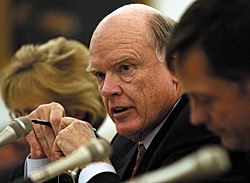 |
|
Snow appearing before the House Ways and Means Committee in March 2003 speaking about President Bush’s economic stimulus plan. Photo by AP/WWP Photo/Susan Walsh
|
GW Law School: What do you hope to leave as your mark in this job?
Snow: I hope the president will regard Treasury as having been a good counselor on economic policy and having helped to implement his policies. People say, “Well, we don’t agree with your dollar policy, or we sure appreciate your growth policy.” I always say, “Look, I work for the president of the United States. The dollar policy, the growth policy—I offer my counsel, but they’re his policies, and I’m a spokesman for his policies.” And that’s an important difference. We started out talking about being a CEO in the private sector. Here you realize that it’s a big arena you’re playing in. And it is the Treasury secretary of the largest and most important economy in the world. But the policies are really the president’s policy. I hope I give him good advice, and I think he values the counsel.
GW Law School: Is there anything we did not discuss that you would like to mention?
Snow: I value greatly my time at the Law School—some 40 years ago now. I think back fondly on many of the professors I had there, and colleagues—fellow law students—that I had, a number of whom I still stay in touch with. It’s a great institution.
Back to top | Summer 2004 Table of Contents
|